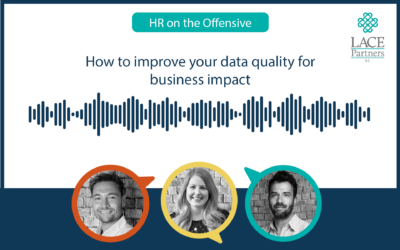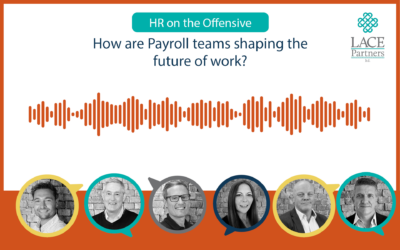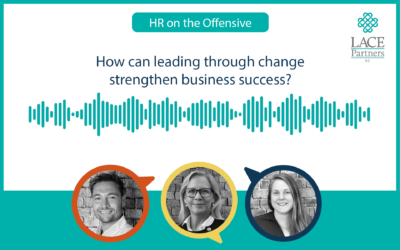What are the top five trends we are expecting for HR in 2023? We are facing a tough year with complex economic and geopolitical challenges and continuing shifts in working life. In this week’s blog we hear from the LACE team about their predictions for HR teams for then next 12 months.
It’s the New Year. The talk of the cost-of-living crisis continues to be front and centre for employers, employees, government, and the media. Jeremy Hunt told us in December that the UK is still heading for recession. For HR teams these big concerns also resonate. But while the concern is very real for HR teams of all sizes, there remains opportunity: HR has a pivotal role as the function owning the People agenda and helping to drive productivity in businesses through its people.
We’ve compiled a few thoughts from our team on some of the key trends that we think HR teams will be focused on in the next 12 months and listed below. But what is your take? We’d love to hear. But in the meantime, here’s what we’re thinking…
1. Hold your value – and do it through your employee value proposition (EVP)
In a market in which talent attraction and retention was one of the elements that 30 CPOs we canvassed last year told us was ‘keeping them up at night’, differentiation is key in keeping your best people, so the big message in 2023 is to ensure you hold that value, even in a difficult market. The inevitable upturn is the time when employees will walk from toxic cultures and organisations not living up to their side of ‘the deal’.
Individuals need to feel invested in and progressive businesses will increase their focus around a future-fit skills agenda. Organisations must work harder to develop critical skills internally and build partnerships in the education sector to support their longer requirements. Additionally, there needs to be a ramping up of wellbeing programmes to support the workforce (e.g. provision of mental health support and increasing private healthcare provisions for workers given the challenges faced by the NHS).
2. The hybrid working challenge will continue to dominate discussion
Line managers will need increased support and training to deal with teams who are hybrid working. This has always been the case post-pandemic, but the stakes continue to rise with the new legislation on requesting flexible working from day one of a new role. In December we asked our community on LinkedIn how it would impact their business: 45% said it would be positive, reflecting the increased choice for employees. However, there will be challenges to overcome in terms of hiring and workforce planning, and it will be HR who needs to ensure the logistics of these requests are managed for the benefit of both employer and employee.
For more reading on hybrid working, take a look at this blog we posted late last year.
3. Consolidation in the HR tech landscape will continue
We have seen this trend already in recent years, as many of the emerging tech providers have either secured funding for rapid growth, or been acquired by the larger enterprise systems. In an industry where digital transformation is changing the landscape, organisations are fighting to be innovative and, in many cases, innovation can be purchased through M&A activity. This trend will continue as the larger players in the market look to consolidate their positions even further.
There has been a huge increase in the number of employee-driven apps – cheaper, faster, more agile, that can meet point needs quicker than some of the large tech vendors can deliver. Don’t be surprised to see those larger platforms looking to acquire the talent that has built those applications or the apps themselves to absorb into their own platforms.
Employee centricity will be at the heart of HR tech; employee experience, employee journeys, talent intelligence and learning all will have the employee as the focus.
4. AI? Are we there yet?
We’ve asked many senior HR professionals about how they use AI (including in our HR Shared Services Trends report last year – you can see more here) and whether now will finally be the time that HR starts to embrace its potential. The answer so far has been only for specific types of functionality (e.g. in the recruitment and talent matching space).
However, as we have noted before, businesses are also looking at how they can improve productivity. AI and machine learning continues to grow in the HR space; organisations are focusing their efforts on how to automate tasks to make them more efficient. For example, some organisations have looked at using automation to highlight pockets of harassment or discrimination, learning paths or recruitment behaviours. The machines are coming, not to take over but to give us a helping hand in focusing HR on delivering those productivity efficiencies that businesses are craving in such difficult times.
5. Let’s get serious about using people data
There are some businesses that are ahead of the curve on how they use their people data and we’ve spoken to several who are driving innovation in this space. Despite this, basic people reporting for so many organisations needs improvement and companies need to get serious about how they leverage their people insights and analytics to make effective data-led decisions.
HR leaders need to identify the ‘exam questions’ that will drive most value for the business and the employee experience, and then understand the analytics required to answer these questions. Better use of data-led decisions, coupled with a need for HR leaders to strengthen their understanding of the external market and talent trends to better support commercial decision making, will all be essential.
What’s your view? Tell us if there are any trends here resonating with your strategic priorities this year – we’d love to hear from you.






